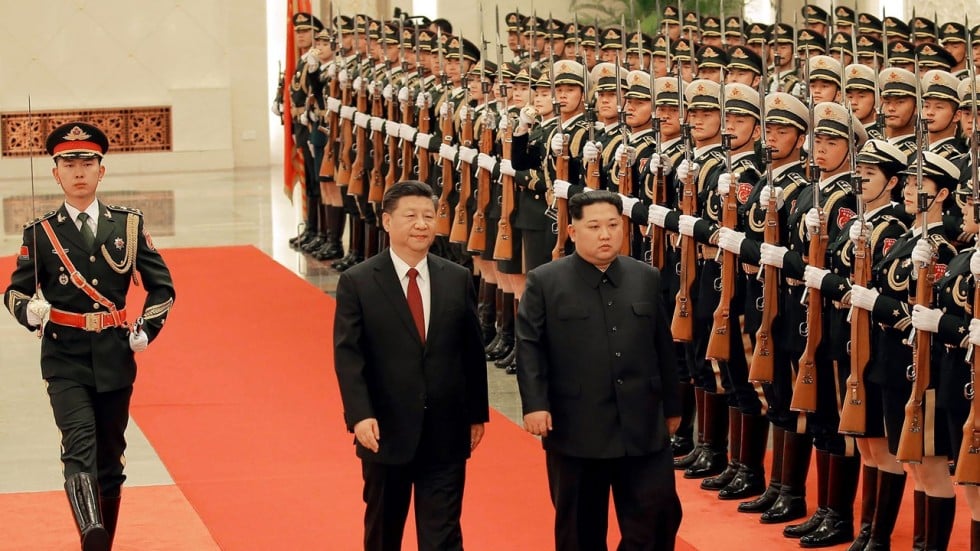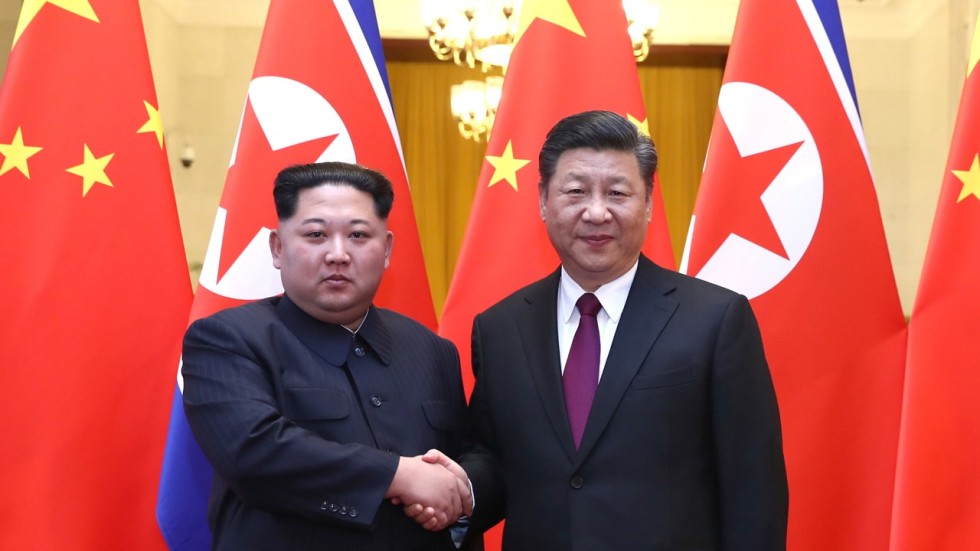https://youtu.be/f8TewXsQYvA
https://youtu.be/5cOCsVVc8Sg https://youtu.be/XzzUWwnRzOU
https://youtu.be/5cOCsVVc8Sg https://youtu.be/XzzUWwnRzOU
Chinese President Xi Jinping and North Korean leader Kim Jong-un held talks in Pyongyang Thursday where Xi received an unprecedented welcome. The talks touched on the China-North Korea relationship and the Korean Peninsula issue.
Xi, also general secretary of the Central Committee of the Communist Party of China (CPC), kicked off his two-day state visit to the neighboring country at the invitation of Kim, chairman of the Workers' Party of Korea (WPK) and chairman of the State Affairs Commission of the Democratic People's Republic of Korea (DPRK).
Xi said during the talks that the international community expects the DPRK and the US to keep pushing negotiations forward to reach a result, and China is willing to provide assistance to the DPRK in its "reasonable concerns on security and development."
China is willing to cooperate with the DPRK and other parties involved in the issue to push the political solution, Xi noted.
Kim responded that the DPRK highly appreciated China's contributions in pushing forward the peace process of the peninsula issue.
His country has made positive efforts to avoid tensions in the past year, but "relevant parties" haven't offered any positive response, and this is not what the DPRK wants to see, Kim said. But North Korea is patient to keep communicating with "relevant parties" to find a solution that could be accepted by all parties, Kim noted.
Zheng Jiyong, director of the Center for Korean Studies at Fudan University in Shanghai, said a key reason why the bilateral negotiations between North Korea and the US can't move on is that Washington doesn't want to offer a positive response to Pyongyang's security concerns. Pyongyang feels insecure and so it is reluctant and suspicious to make more concessions, he noted.
"China is capable of making North Korea feel secure and protecting it from unreasonable bullying and threats," Zheng said.
Lü Chao, a research fellow at the Liaoning Academy of Social Sciences in Shenyang, said that although the US prefers a bilateral mechanism, it still needs a third party to guarantee the implementation of denuclearization once it reaches an agreement with North Korea.
A third party or a new international cooperation mechanism is needed at this moment, Chinese experts noted, as the G20 summit in Osaka, Japan will take place at the end of the month, and five parties - China, the US, Russia, Japan and South Korea - of the Six-Party Talks, except North Korea, will gather in Japan, offering a good opportunity for them to discuss such an issue.
China is showcasing its unique influence over the peninsula issue to the US before the G20, Chinese experts noted.
Unprecedented ceremony
From the welcome ceremony at Pyongyang International Airport to the unprecedented salutation at the Kumsusan Palace of the Sun, Xi received the highest-level reception in the capital of North Korea that shows North Korea attaches great importance to the China-North Korea relationship with firm traditional friendship, Chinese experts noted.
About 10,000 people participated in the ceremony at the airport to welcome Xi and his wife Peng Liyuan. Meanwhile, hundreds of thousands of Pyongyang citizens formed a long welcoming line alongside the highway from the airport all the way to the Kumsusan Palace of the Sun. There were national flags and banners with slogans about friendship, unity and welcome everywhere in Pyongyang on Thursday.
This is the first time that a visiting foreign top leader received a salutation from the North Korean people at the Kumsusan Palace of the Sun, a magnificent building near the northeast corner of Pyongyang that serves as the mausoleum for Kim Il-sung, founder of the DPRK, and for his son and North Korean former leader, Kim Jong-il, who were both posthumously designated eternal leaders of North Korea, Xinhua reported.
Special relationship
"This is like three generations of North Korean leaders are witnessing a new milestone in the bilateral traditional friendship being forged by Xi's visit," Lü said.
After the ceremony, Xi and Peng moved into the Guesthouse of Kumsusan. Zheng said that the Kumsusan has unusual meaning in North Korea as it belongs exclusively to the Kim family. Kim was trying to emphasize his close and unique relationship with Xi.
"The ceremony is just like welcoming a family member and this also means the two parties and the two countries have a special relationship," Zheng said.
Rodong Sinmun, the WPK's flagship newspaper, said in an editorial Thursday that Xi's visit to "the DPRK despite the urgent and important tasks due to the complicated international relations vividly shows that the Chinese party and government are placing great importance on the DPRK-China friendship."
The history of the DPRK-China relations vividly records the comradely friendship between the leaders of the elder generation who closely cooperated with each other hand in hand on the road to accomplishing the cause of anti-imperialist independence, peace and socialism, the editorial said.
Xi said during the talks with Kim that the China-DPRK friendship is a strategic choice made by the two sides with a long-term and overall perspective and will not waver due to changes in the international situation.
It is a steadfast policy of the CPC and the Chinese government to maintain, consolidate and develop China-DPRK relations, he stressed.
The top leaders of China and the DPRK agreed during their talks to work together to create a bright future of inter-party and inter-state relations at a new starting point in history, Xinhua reported.
Source link







